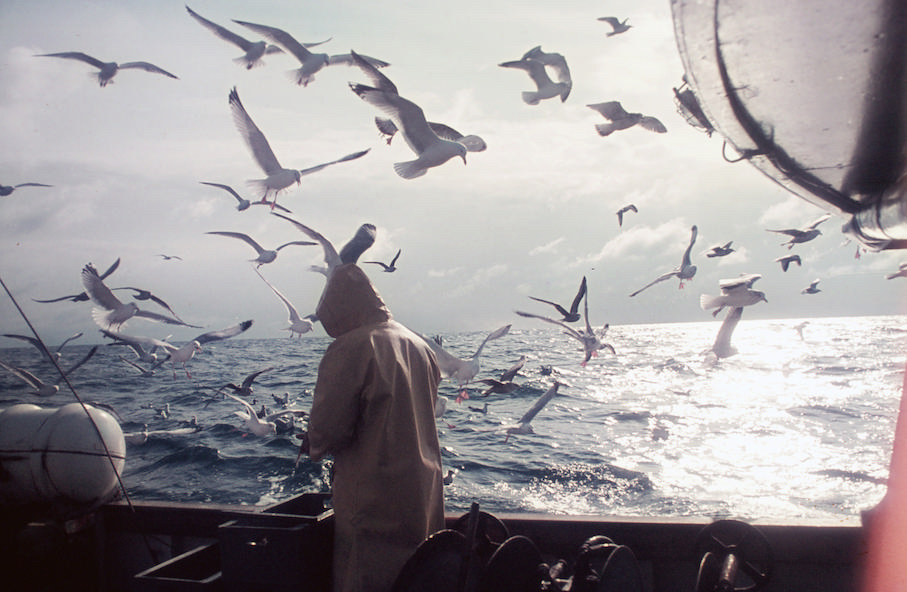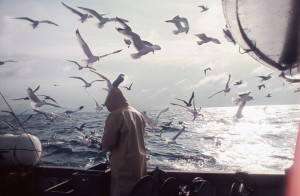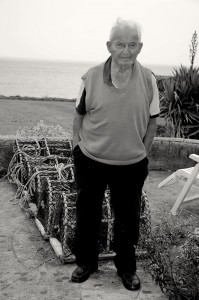Bill Hocking
At 87, Bill is Britain’s oldest working fisherman, still laying lobster pots with his 15ft boat off the Cornish coast. He talked to Phil Russell about the ‘Great Mackerel Klondyke’, the sinking of his boat and more
Working on your own leaves no room for error
– one clumsy move and you’re over the side
with your pot
I think I can count on one hand the people I have known for whom I have huge regard, respect and would trust my life with. Two of them happen to be fishermen; one was the coxswain of the Padstow lifeboat, the other is Bill Hocking who is 87 years old, married for 63 years, living in Downderry, Cornwall, and still fishing for a living.
I first met Bill back in 1973 when on leave in Downderry from the RAF. My mother and father-in-law had a small business there and an invitation to go potting with Bill was an opportunity too good to miss. Working his small wooden motor boat off the beach, Bill had 200 pots close to shore and although this boat was only about 15ft (4.5m) it was well equipped with a pot hauler, echo sounder and a steadying sail.
Watching Bill handle this boat was sheer poetry. It was like an extension of himself, nothing hurried, everything deliberate. Working on your own in this environment leaves no room for error – one clumsy move and you’re over the side with your pot.
Bill however doesn’t like shellfish and he’s not very keen on fish either, he always takes strawberry jam sandwiches and a banana to sea as he said that the jam sandwiches taste the same coming back as they do going down! So why would he ever want to get up at 5.30 nearly every morning, in all weathers, to torture himself in the wind and rain?
Personally I have no idea, but the fact is that Bill started fishing out of Looe in 1944 and has always fished. Like some obsession he can’t imagine life without it and in fact prefers to be at sea, he says. Apart from a brief spell in the Navy as a medic during national service (where he was able to wangle night time fishing trips whilst able to get some kip during the day) he has done nothing else.
The early days were spent night drifting for pilchards. Vast amounts were caught until they were all gone, then the boats were fitted out for trawling to catch an assortment of fish – lemon sole, whiting, skate and monkfish. During the summer months up to October, Bill handed his boat Ella over to another skipper to do what Looe became famous for and that’s sports fishing for shark, while he did his potting off Downderry and became known as “Downderry Bill”.
I loved my short period spent fishing with Bill off Downderry and I recall one time sitting at the rear of the boat sorting crab and lobster when I caught a wry grin on his face which soon developed into a hearty chuckle as he popped the crabs into the keep pot. “What’s so funny?” I enquired. “Have a look under your smock,” he said. I looked down to see the biggest cock crab you ever saw with claws raised only half an inch away from my wedding tackle and as a castration was not in my future plans I moved the offending crustacean ever so gently away.
Strict laws concerning the size of lobsters which are allowed to be landed are in force, so as each one is removed gently from the pot it is measured, the small ones go back over the side and as Bill says: “That’s the trouble with the small ones, they never are very big!!” The ones to keep get a little kiss and are thanked, a rubber band is placed over the claws and they are put in the basket. Lobsters are handled with care as they can bleed to death before you get them ashore and become useless, an awful waste, so never buy a dead lobster unless it’s been pre-cooked.
I asked Bill about some of the hardest times. He recalled the days of the cod war when boats from Scotland were banned from fishing off Iceland and invaded the waters of the western approaches. This was during the time when mackerel fishing became known as the Great Mackerel Klondyke. Boats of all sizes were pressed into service to enjoy the abundance of these fish that had suddenly found a place in the market. Several hundred stone were landed daily and all these fish were caught on hand lines by crews that had become used to the abundance of the bounty. It was not long however before the Scottish and foreign boats became aware of the riches being landed in the West Country, so, banned from the Icelandic waters they soon turned up on the doorstep. Not little fishing boats but multi-million pound trawlers that had to earn big money to keep them and their crews. They literally hoovered up the fish and delivered them to the Factory Ships from the Eastern block that stationed themselves in the sheltered waters.
This situation of course could not be sustained for long and soon they depleted the stock so it was no longer viable, hence the demise of the mackerel in abundance.
The local boats, measuring anything from 15ft to 60ft earned a nice living fishing for mackerel and often overloaded with fish, it was like the pilchard days all over again as boats arrived at the fish quay at Looe loaded to the gunwales and it was during one of these trips with the Ella on auto pilot that she rammed the Polperro fishing boat Compass Rose. Bill of course escorted the boat back into harbour fortunately, without any casualties,
Such was the rush to get to shore and unload the catch that sorting fish was done with all hands into small medium and large, the quayside would be packed with boats all trying to do the same thing and this process would continue into the night. There was always an early start the next morning so until the unloading was finished and the boats readied for the next day, that was the time when the crews could then get some sleep.
The truth was that if Bill went to sea
then so did everyone else;
if he didn’t, only the foolhardy went
In the early mornings well before dawn, the crews gathered on the quayside as they have done for hundreds of years. If the weather was bad then the big question would be: “Who is going first, if at all?” They say there are only two types of fishermen, the needy and the greedy and Bill said he had no doubt about which category the others thought he was in, but the truth was that if Bill went to sea then so did everyone else, and likewise if he didn’t go, only the foolhardy went and even then that was very unusual.
It was in the middle of the night when Bill’s crew from one of his boats, the Natalie, arrived on his doorstep soaking wet. “Err, morning Bill, we have lost your boat off the Eddystone.” Fortunately no-one was drowned, but as I talked to Bill about the incident it was clearly painful. He became thoughtful and seemed to hold back for a moment. He said that several thousand pounds were spent on trying to recover the wreck but sadly without success, so maybe this is where the passion is. He told me he should have been a farmer because he likes beef but it’s the business of fishing that claims your soul, the boats become part of you, the people, the handling of the nets, the smell of the sea and the business of coming and going and each day the quest for a little more.
Bill is 87 now and still works 40 pots in the summer months, in fact he has just this month (October) laid up his gear for the winter. When he was 70 he had a stroke which he says ‘slowed him up a bit’ and he finds walking a little more difficult so now his boat is kept at Looe which means he no longer has to use a dinghy. He says he belongs at sea and finds the long winters tiresome, but he finds things to do and he supports his son with his wealth of experience which is not something you can buy in the chandlers or download from your laptop and he should know; he has just got his first computer and he hates it.
Bill lives for his fishing, he is happy, he has enjoyed a lifetime doing it and can’t understand why anyone would do a job they hate or don’t find enjoyable, it makes no sense to him. He has no intention of stopping doing something he has loved doing all his life. And there is no reason to. I am sure he will be doing it for ever, wherever that might be.




